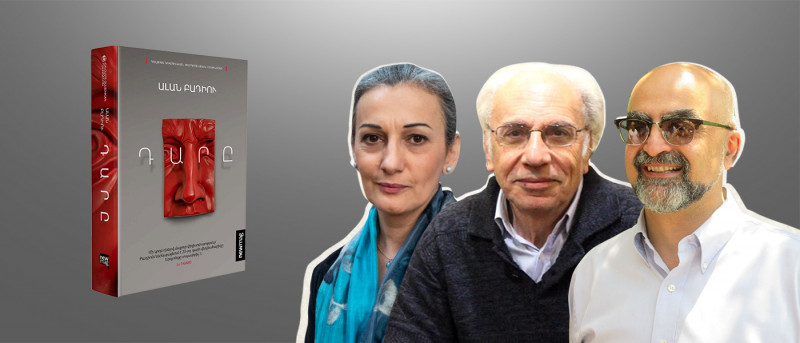Poetry, theatre, music and a bit of sentimentality. TV Presentation of Alain Badiou’s “The Century” book (photos, video in Armenia)

The TV presentation of Alain Badiou’s “The Century” book was held in the scope of Armenia TV’s “Good Morning” program. The thirteen chapters of the book are presented as lessons derived from a seminar Badiou gave at the College International de Philosophi
Newmag translated and published one of the most discussed books of the recent years. Badiou is one of the most famous contemporary philosophers. He has written about the concepts of being, truth, event and the subject in a way that, he claims, is neither postmodern nor simply a repetition of modernity. Badiou has his own definition of the qualities that a philosopher should have. “A philosopher should be optimistic. Pessimists don’t need philosophy.”
Born in Algeria and fighting against colonization, Badiou wrote his book based on 13 lectures he read to his students. He has written more than 30 works. The Marxist philosopher tries to understand why the 20th century was cursed. Associate professor, Candidate of Philosophy Arman Gharagulyan discusses some of Badiou's ideas. “Badiou believes that we have a lot of awkward topics in the 20th century, which we avoid to discuss philosophically. He believes that we shouldn’t speak about Nazism in an accusation manner until we fully depict its core meaning.”
“The Century” book is one of Badiou’s fundamental works. The Candidate of Philosophy believes that it is almost impossible to ignore the book and ideas behind it. Arman Gharagulyan mentions that in the book French philosopher answers the question - what happened in the 20th century? “His narratives are convincing. Badiou presents both images, facts and uses a unique style of writing. He firstly asks a rhetorical question on the reasons of wide scale wars and then answers to his question, pointing that there should be a final war.”
The editor of this book is Mark Nshanian. He notes that the language of the Marxist philosopher is colloquial, but sophisticated. He suggests reading the book from the ending, as the last chapter is the most important! The translator and the editor worked together to translate the complex philosophical terms into Armenian. Thus, the translator's Eastern Armenian language and the editor's Western Armenian language are reconciled.


It was challenging to translate a philosophical book with conversational French. The book translator Nazeni Gharibyan claims that Badiou structures his ideas based on linguistic nuances. “The main idea is that this book wants to break with the romanticism of the previous century. In the end of the book the author firstly reminds what was left from the shocking 20th century. Then he argues that it is possible to create a human by cloning, but there is no project behind him.”
The book is published in the scope of the “Calouste Gulbenkian Translation Series” program. The program was launched in 2015. The main goal is to publish Armenian translations of the most influential academic pieces. Razmik Panosian mentions that Badiou’s book encompasses events starting from the First World War until the collapse of the Soviet Union. “In order to fully understand today’s reality, it is crucial to read this book. He has also analyzed the Nagorno Karabakh conflict. You will see what are some of the details that he emphasized in the book. Especially in this post-war period it is essential to make the right conclusions.”

The proofreader of this book Zohrab Haroyan highlights that the war has not ended yet, so it is the right time to analyze and think about both short-term and long-term plans. In this sense, he strongly suggests reading Badiou’s book. “Badiou claims that this is the result of complex reality, which consists of both political, cultural and other components.”
Poetry, theatre, music and a bit of sentimentality: Alan Badiou’s “The Century” book thoroughly discusses the past century and helps to think about the future ones.
Read also

At Winterfest 2026, Newmag will present Henrikh Mkhitaryan’s memoir “My Life Always at the Center” (trailer)

Winterfest to feature David Georgyan’s sci-fi action novel Impedance (trailer)

At Winterfest 2026, Newmag will present Marianna Hakobyan’s “Don’t Change the Names” (trailer)

Closing and Award Ceremony of the “Sprout in Armenian – 2025” Competition at Newmag Winterfest

